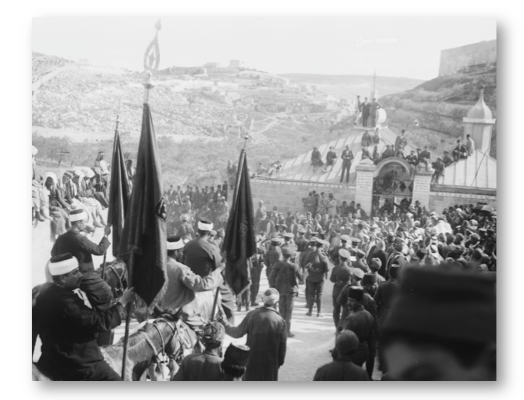On April 4, 1920, before the establishment of the State of Israel and before any so-called “occupation,” a Muslim festival attended by tens of thousands of Arabs erupted into violence against Jews in Jerusalem.
Nebi Musa is Arabic for the “Prophet Moses.” In addition to being the greatest Jewish leader and prophet in history, Moses is also considered a prophet by Muslims.
On April 4, 1920, the Nebi Musa festival, a Muslim pilgrimage to the site believed by Muslims to be the grave of Moses, near Jericho, erupted into violence that left five Jews and four Arabs dead after three days of fighting. Hundreds more, mostly Jews, were wounded. The violence occurred amidst rising tensions in Arab-Jewish relations over increased Jewish immigration and attacks on outlying Jewish settlements in the Galilee. Speeches by Arab religious leaders during the festival led to an outbreak of violent assaults on the city’s Jews.
‘Agony of Fear and Hatred’
In his memoirs, Ronald Storrs, the British military governor of Jerusalem, wrote, “Enough that for the time all the carefully built relations of mutual understanding between British, Arabs and Jews seemed to flare away in an agony of fear and hatred. Our dispositions might perhaps have been better (though they had been approved by higher authority), but I have often wondered whether those who criticized us in Europe and America could have had the faintest conception of the steep, narrow and winding alleys within the Old City of Jerusalem, the series of steps up or down which no horse or car can ever pass, the deadly dark corners beyond which a whole family can be murdered out of sight or sound of a police post not a hundred yards away. What did they know of the nerves of Jerusalem, where in times of anxiety the sudden clatter on the stones of an empty petrol tin will produce a panic? The Police were but partially trained and wholly without tradition. There was no British gendarmerie: we had not one single British Constable.” (Storrs, Ronald, The Memoirs of Sir Ronald Storrs, 1937, p. 348)
The riots took place on the second day of Passover and led, among other things, to the formation of the Haganah, the precursor to today’s Israel Defense Forces, in June of 1920 as well as to the decision by the British to change from a military administration of Palestine to a civilian one.
Arab opposition to the establishment of Jewish communities in the Land of Israel from the Mediterranean Sea to the Jordan River shows that the current Arab-Israeli conflict has nothing to do with “occupation” of land liberated by Israel during the 1967 Six Day War.
Source: Center for Israel Education
